CRI实用英语课堂 Unit 62 Material Girls 大话“物质女郎”
搜索关注在线英语听力室公众号:tingroom,领取免费英语资料大礼包。
(单词翻译)
Part 1 The Fashion Queen 流行女王
Dialogue Script 1 对话原文 1
Peter: I love your outfit1!
Tina: It's Armani with Gucci shoes. One of the Sex and the City girls wore it before.
Peter: That show's so hip2! They've got it going on, fashion-wise.
Tina: Oh, totally. Especially Sarah Jessica Parker. She's my fashion guru.
Peter: My sister, Sarah, loves her too. She just wishes she had the money to buy their outfits3.
Tina: What labels would she buy?
Peter: Versace. She loves the Versus4 collection. Oh, and DKNY and CK. She talks about those labels all the time.
Tina: She has good taste.
Peter: She didn't always have. Look at these pictures in my wallet.
Tina: Hah! That's the Japanese co-gal style. 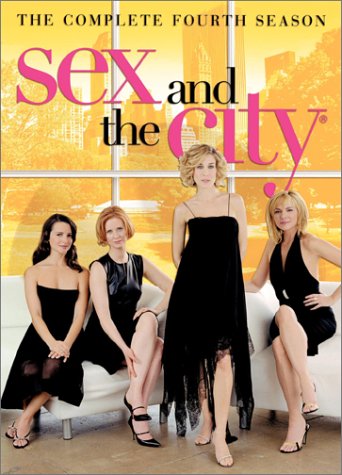
Peter: Yeah, look how white her eyes are. Scary, huh?
Tina: It's not so bad. It's better than this one. Is that a club outfit?
Peter: Oh, yeah, it's totally retro. Can you believe she used to go out disco dancing?
Tina: Can you believe her hair? That's classic5.
讲解:
1. 对话中,Peter 和Tina在谈论fashion,时尚。Peter很喜欢Tina的打扮,Tina说It's Armani with Gucci shoes. 这是Armani搭配Gucci的鞋子。《欲望城市》中有一个女生穿过。Sex and the City,是一部美国电视剧,透过四位纽约时髦女性的故事,来讨论现代人爱情观的电视剧,其中女主角之一是Sarah Jessica Parker。她可是现今好莱坞服饰潮流的一个风向标,连Peter都觉得这部电视剧很棒。That show's so hip! hip是形容词,表示“时髦的,赶潮流的”。They've got it going on, fashion-wise. 她们对潮流很敏锐。have got it going on 这个表达方式呢在对话中是用来形容《欲望城市》这部电视剧对于潮流的敏锐度,剧中人物的穿着打扮,足以掀起一波流行风潮。
2. going on 给我们的感觉是“一直在进行”,表示不断在求新求变求进步,it在这里自然就是指所提到的事物;have got it going主要是用来形容人“很酷,很棒”,是一种表达极度称赞的口语化说法。 我们用一个对话来作例子,---Why do all the girls like Tom so much? ---He's just got it going on, whatever it is. ---为什么所有的女孩子都喜欢Tom?---不管怎么说,他很有一套。
3. fashion-wise 表示“流行敏锐度,对潮流的敏锐程度”,凡是用-wise这样的形式做词尾的单词,就表示“对某方面很敏锐的”,比如说,He's successful, business wise. 他在做生意方面很成功。Tina最喜欢《欲望城市》里面的Sarah Jessica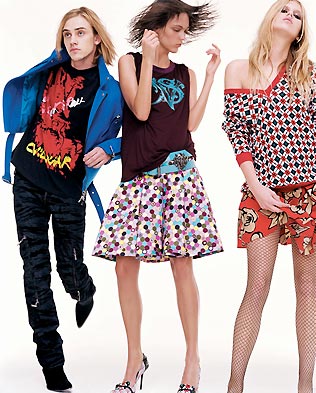 Parker,说她是自己的流行教主,She's my fashion guru. guru就是指“精神上的领导者。
Parker,说她是自己的流行教主,She's my fashion guru. guru就是指“精神上的领导者。
4. Peter的妹妹Sarah也疯狂地迷Sarah Jessica Parker,她希望自己有足够的钱能够买像他们那样的行头。那么Peter的妹妹会买什么品牌的呢?有Versace范思哲旗下的Versus系列,还有DKNY和CK,就是Calvin Klein,都是非常有名的时尚品牌。
5. Tina觉得Sarah的品位挺不错的,不过Sarah以前可没有这么好的品位。Peter的钱包里有一张照片,上面的Sarah还是日本的109辣妹装,就是 Japanese co-gal style,特色就是染很浅颜色的头发,全身打深色粉底,涂白色系列口红,眼影,脚穿厚底高跟鞋。所以Peter说他妹妹的眼睛看起来白的吓人。
6. 不过Tina觉得这张照片不是最糟糕的,还有一张照片Sarah梳着复古的发型,retro就是“复古”的意思。
Dialogue Script 2 对话原文 2
Tina: Thanks, Maria. I'll come and get it soon!
Sandy: Look, I've been saving6 my money for this DKNY outfit in Marie Claire.
Tina: Nice, the pick of the month. Elle had it, too.
Sandy: It's at Sogo. Want to come with me?
Tina: Did you ever ask the right person!
Sandy: You shop there often?
Tina: All the clerks know me. That was who just called.
Sandy: You're on a first-name basis? 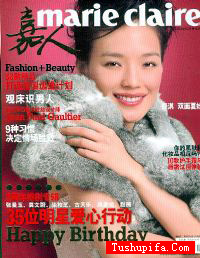
Tina: Sure. Maybe we can get you a discount.
Sandy: Really? I'll get one of those traditional Chinese top, then, too.
Tina: And a gold belt. It'd look great with those bell-bottoms you're wearing.
Sandy: That's a Cosmo fashion tip, isn't it? I read that magazine religiously.
Tina: I even get the Italian edition.
Sandy: Tina, how do you afford to keep up with changing fashions?
Tina: Oh, my salary. And daddy gave me a credit7 card.
讲解:
1. 对话中,Tina接到了一个电话,让她去店里拿衣服。她的朋友Sandy拿着一本Marie Claire《嘉人》杂志指给Tina看,说她一直在攒钱想买这套衣服。Tina觉得这套衣服很不错,是当月的精选,the pick of the month。the pick of sth 表示“最佳选择,精华”,比如说,She's the pick of the bunch. 她是那拨人当中出类拔萃的一个。
2. 这是一个非常口语化的说法,the pick of the bunch,就是指“出类拔萃”的人或者事物。Sandy挑选的这套衣服在Elle杂志上也出现过。对话里面出现的Marie Claire《嘉人》、Elle和Cosmo,全名是Cosmopolitan《时尚》,都是著名的女性时尚杂志。
3. Sarah看中的衣服在Sogo有卖的,她问Tina要不要跟她一起去买。Tina得意地说,Did you ever ask the right person! 你还真问对了人! 这个句子从字面上看来的意思是“你有没有问过对的人?”其实说这句话的人是在说反话,真正要表达的是“你还真是问对人了!”表示对方所问的问题,自己正是最佳的回答人选。比如说,---How can I make my hair curlier8? ---Did you ever ask the right person! I'm a hair stylist.---怎么才能把头发弄得更卷啊?---你还真是问对人了!我是发型设计师。
4. Sandy很羡慕,原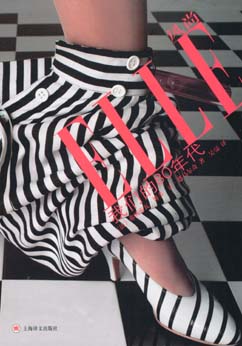 来Tina常在Sogo里面购物,几乎所有的店员都认识她了。刚刚打来电话的就是Sogo的一个店员。这让Sandy更惊讶了,You're on a first-name basis? 你们都已经熟悉到叫名字的程度了?first-name大家都知道是指“名字”,不是姓氏。互相称呼名字,就表示已经很熟了
来Tina常在Sogo里面购物,几乎所有的店员都认识她了。刚刚打来电话的就是Sogo的一个店员。这让Sandy更惊讶了,You're on a first-name basis? 你们都已经熟悉到叫名字的程度了?first-name大家都知道是指“名字”,不是姓氏。互相称呼名字,就表示已经很熟了
5. Tina说也许她会找熟人给Sandy弄到折扣。Sandy更兴奋了,这样她也可以再买件中国传统风格的上衣了。Tina还建议她买一条金色的皮带,搭配Sandy身上的喇叭裤一定会很好看。bell-bottoms 就是指“喇叭裤”。
6. Sandy一听就知道这是Cosmo的流行穿衣建议,fashion tip。她把Cosmo这本杂志当作流行宝典来读,I read that magazine religiously. Tina甚至还有Cosmo的意大利版本,能获得更多原汁原味的流行资讯。
7. 不过Sandy觉得奇怪,Tina怎样来跟上潮流的变化速度呢?Tina说她用她的薪水,还有爸爸给的一张信用卡,才能支付起昂贵的置衣费用,看来美丽是需要付出代价的。
Part 2 Dress for Success 为成功而穿
Dialogue Script 1 对话原文 1
Peter: Hey, Tina...Whoa! What a pile of clothes!
Tina: I'm going to give a few of these things to a girl at work.
Peter: How many times did you wear this? It looks brand new.
Tina: Two times. If I wore it a third time everyone would know it's old.
Peter: This one's nice. Why don't you wear it any more?
Tina: Yuck, that's last year's fashion. Use it as a dish cloth or something.
Peter: This skirt has three holes. 
Tina: That's upside down. It's a shirt.
Peter: This one's a skirt, though. But it's see-through and torn.
Tina: That's the design, doofus.
Peter: Anything you can give me?
Tina: (laughs) I don't think they're your size.
Peter: Not to wear, silly. To sell. I need all the money I can get to open my restaurant.
Tina: Why not. I'd never be caught dead wearing them again.
Peter: I can give you twenty percent of the sales...
讲解:
1. 对话中,Peter来找Tina,正好看见Tina抱着一大堆衣服走了出来,What a pile of clothes!这个感叹句就是说“衣服堆得像一座山”。
2. Tina要从里面挑几件衣服送给公司的一个女孩。Peter从里面拿出了一件,问Tina这件衣服穿了几次,因为衣服看起来像全新的。brand new 表示“崭新的,全新的”。
3. How many times did you wear this? 我们以前见过以How often...开头的句子,这是在问频率,就是“多久一次”的意思。而How many times...要问的很明显就是“有几次...”。在回答这两个问题的时候,你的答案之中,一定免不了会有“几次”的说法出现。如果你从来没有这种经验,你大可以说Never,从来没有。
4. 要不就得知道美语中算次数的方法,免得答不出来。其实算几次也很简单,只要把数字放在前面,再加上time或者复数times就行了。比较特殊的是“一次”可以说成once,两次就说twice。我们用对话来作例子,---They hung up. How many times did the phone ring? ---Only, twice, I think. ---他们挂掉电话了,你听到电话响了几声?---我想只有两声吧。
5. 至于两次以上的次数,就全部都是数字+times了,比如说,---Mom, can I go out and play? ---I've told you a hundred times. You need to get your homework done first. ---妈妈,我可以出去玩吗?---我和你说过100次了,你得先把作业做完。这件衣服Tina只穿了两次,就不想穿了,因为如果一件衣服穿超过三次,别人就都会知道它是旧的了。
6. Peter又挑出了一件,也是很不错的衣服,Tina为什么也不穿了呢?因为这件衣服是去年的旧款,所以Tina打算把这件衣服当作洗碗布什么的,真的是挺可惜的。Peter挑出了一件裙子,上面有三个洞。原来是他拿反了,这是一件上衣。upside down就是“上下颠倒”的意思。
7. Peter拿出了另一件裙子。但是这件裙子不但透明,而且还破破烂烂的。But it's see-through and torn. see-through是一个合成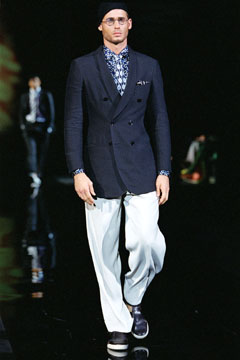 词,就是“透明的”的意思。结果Peter被Tina取笑,人家就是这么设计的,Peter真是个老土,That's the design, doofus. doofus是一个俚语词汇,表示“笨蛋,不通世事的人”。
词,就是“透明的”的意思。结果Peter被Tina取笑,人家就是这么设计的,Peter真是个老土,That's the design, doofus. doofus是一个俚语词汇,表示“笨蛋,不通世事的人”。
8. Peter问Tina有没有能给他的东西,Tina还以为Peter要穿呢,所以笑他说,I don't think they're your size. be one's size 表示“是...的尺寸”。比如说,要表达“这双鞋是你的尺寸”我们就可以说These shoes are your size.和汉语的顺序是一样的,所以比较好记。同样类型的常用句型还有A's B's age,A和B的年纪一样大。
9. 比如说,---How old is Mary's son? ---I think he's my age. ---Mary的儿子多大了?---我想他和我一样大。那么在前面说过的“How many times...”的解说中提到twice,这个词在比较大小的时候,就代表“两倍大”。举个例子,---Why does Jenny go out with that guy?---I don't know. He's twice her age. ---Jenny为什么跟那个人出去?---不知道,他的年纪比她大了一倍。
10. Peter要这些衣服才不是要穿呢,而是拿来卖,因为他要尽可能地筹钱开餐厅。Tina觉得这个主意不错,因为她死也不会再穿这些衣服了。Peter还答应会分两成卖衣服的利润给Tina。还好,这些衣服可以拿来卖,要不然穿几次就扔掉可太奢侈了。
Dialogue Script 2 对话原文 2
Tina: Just one question. What will you wear?
Peter: It doesn't matter what you wear. You just need to talk the talk.
Tina: Wrong! If people believe you know what style is, they'll buy from you.
Peter: So, what should I wear then, Miss Fashion Queen? A suit?
Tina: Here's the problem. Your suits suck.
Peter: Thanks for building me up there, Tina.
Tina: O-oh, Peter, I'm sorry. I mean. They just aren't...
Peter: Comfortable. I believe in wearing clean clothes and dressing9 neat, but...
Tina: ...but guys look so handsome in suits. 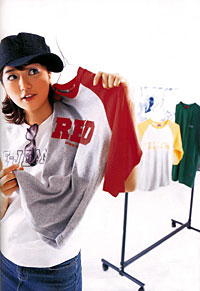
Peter: I don't. I hate jackets and ties and sweating.
Tina: Ooh, ooh, ooh! I know. (takes a box out of her closet) Try this on!
Peter: Wow, you shouldn't have.
Tina: I didn't. It was for my ex. It's a Versace casual10 suit.
Peter: This looks really stylish11, and expensive. Are you sure?
Tina: Let's just say it's a gift from dad.
讲解:
1. Tina问Peter,如果让他去卖衣服,Peter准备穿什么呢?Peter觉得穿什么并不重要,只要说该说的就好了。talk the talk就是说“说该说的话”,这里talk既作了动词,也作了名词。
2. Tina说这样的观念是错误的,如果大家相信你懂时尚,他们就会跟你买衣服了,如果自己都穿的都没有时尚的感觉,别人当然不会相信你挑衣服的眼光了。
3. Peter问那应该穿什么呢,难道穿西装吗?Tina说没错,就是你的西装太老土了。suck大家都知道了,是俚语词汇,表示“差劲,令人讨厌”。
4. Peter听了很不是滋味,酸溜溜地说,Thanks for building me up there, Tina. 谢谢你“夸奖”我啊。 build sb/ sth up 表示“吹捧某人或者某事物”,经常用于被动语态,比如说,The novel was built up to be a masterpiece, but I found it disappointing. 这部小说被吹捧为杰作,可是我觉得很令人失望。
5. Tina也觉得说的太过分了,赶紧道歉。她只是想说Peter的西装看起来让人不舒服。Peter的穿衣风格是整齐干净利落,但是Tina觉得男生穿起西装来很帅气,guys look so handsome in suits。
6. look good in sth就是“穿…很好看”的意思。 但是如果用事物当主语,就是It looks good.的时候,就是指“情况看起来不错,大有可为”。而对话中是以人为主语,look good in suits直译过来就是“在西装里很好看”,其实就是“穿西装很好看”,因为衣服穿在外面,而我们是在衣服里面,所以用in这个介词。
7. 另外,我们衣着配饰的颜色,也是用in当作介词,同样也可以用上look good in +颜色来表达,比如说,---Maybe I should change into something else? ---No, you look great in red. ---我是不是该换别的穿?---不用了,你穿红色很好看。 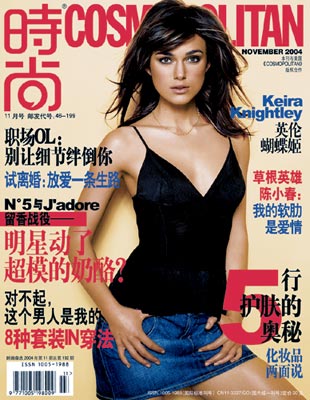
8. 尽管如此,Peter还是不喜欢穿西装,他讨厌外套和领带,还有穿西装很闷热,会出很多汗。Tina突然想起自己家里有一套男士的休闲西装,是范思哲的,可以送给Peter穿。Peter还以为这是Tina特意为他准备的,说you shouldn't have. 你太费心了。你太破费了。
9. You shouldn't have. 这句话字面上是指“你不应该这样做。”部分省略了之后,成为习惯用语。在使用的时候,可能是当对方做了一件你觉得不妥的事情,你带着责备的语气和他说You shouldn't have.“你不应该这样做。”
10. 不过更常用的场景就像对话中的一样,是在收到对方的赠礼或者帮助之后,用You shouldn't have.“你真是太费心了。”来感激对方。比如说,---This is for you. ---Oh, you shouldn't have. I don't know what to say. ---这是给你的。---你太费心了!我真不知道说什么好。
11. 虽然这套西装是Tina为她的前男友准备的,但是这套衣服还是很贵的,所以Peter问Tina确定要送给他吗?Tina说就权当是Tina的爸爸送的礼物吧,因为这套衣服也是Tina用爸爸给她的信用卡买的。
Part 3 Change Alone with the Fashions 紧跟潮流
Dialogue Script 1 对话原文 1
Tina: So, how are the sales going?
Peter: I could just kiss you; the customers loved me!
Tina: See! It's all in the way you dress. Just dress for success.
Peter: I believe you now. I sold the last item today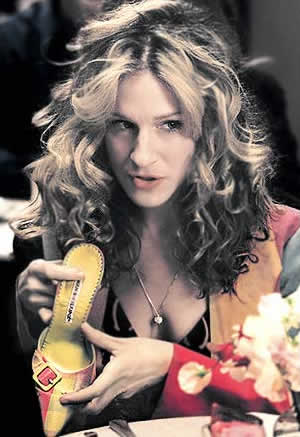 ! Here's your cut!
! Here's your cut!
Tina: Wow! That's, like, 6,000 yuan.
Peter: I almost made enough to open my restaurant.
Tina: And I can go shopping - in New York!
讲解:
1. 那么Peter的衣服卖的好吗?Peter说非常得好,顾客都非常喜欢他。Tina说,看吧,这全在于你的穿着,只为成功而穿吧。Just dress for success.
2. Peter现在完全相信Tina的话了,今天他刚刚卖出了最后一件,可以给Tina分成了,Here's your cut! cut就是指“分摊到的一份”。
3. Tina大概数了一下,能有6000元钱。That's, like, 6,000 yuan. 这里说一下这个like,在句子中表示“大约”,这时候like是用来助兴的,而没有任何实际的意义,就和汉语里的那些虚词是一样的。
4. 比如说,---The care will take, like, two or three days to fix, right? ---No, probably more like two weeks. ---我看修理这辆车要两三天时间吧。---不,我看要两三个星期才行。现在Peter几乎赚够了开餐厅的钱了。而Tina也可以到纽约好好地血拼一番了。
Dialogue Script 2 对话原文 2
Peter: You just came home from work? 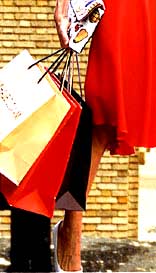
Tina: Yeah. Why?
Peter: You're wearing jeans! And a T-shirt!
Tina: It's that total "be yourself" fashion.
Peter: I totally agree with you, but you never wear jeans.
Tina: Well, I saw Sarah Jessica Parker with her model friends in the Big Apple.
Peter: And she was dressed like that?
Tina: Yeah. So it's my new style.
Peter: But didn't you just say "be yourself"?
Tina: Anyway. Who I am changes along with the fashions.
Peter: Hey, actually we're twins. I have a pair just like that.
Tina: Not likely. This pair's Armani!
Peter: Man! That's like, 1,200 yuan! When you're done with them, can I sell them?
讲解:
1. 对话中,Peter看见了Tina,问她是不是刚刚下班回家,因为他很惊讶地发现Tina穿着一条牛仔裤和T-恤,这不是Tina的一贯风格啊。
2. Tina告诉Peter这就是所谓的“作你自己”的流行风格,"be yourself" fashion。Peter完全同意,但是Tina以前从来不穿牛仔裤啊,是什么让她改变了主意呢。
3. 原来Tina在纽约的时候看见了Sarah Jessica Parker和她的那些模特朋友们,他们都穿着牛仔裤和T-恤,所以Tina也转变成了这样的风格。Peter很奇怪,Tina不是说什么“作你自己”的风格吗,怎么还跟别人学呢?
4. 因为随着时尚流行走,就是Tina,所以也无所谓了。Peter发现自己有一条和Tina穿的一模一样的裤子,所以说actually we're twins. Tina说这不可能,她的裤子可是Armani的。Peter一看裤子的标牌,上面的价钱是1200,让他吃了一惊。
5. Peter又发现了商机,问Tina不想要这条裤子的时候,可不可以让他拿去卖。When you're done with them, can I sell them? be done with sth 从字面上来看,是指“和...完了,结束了”,而在使用上的场景有很多,with的后面可以接事物,表示“看完了,用完了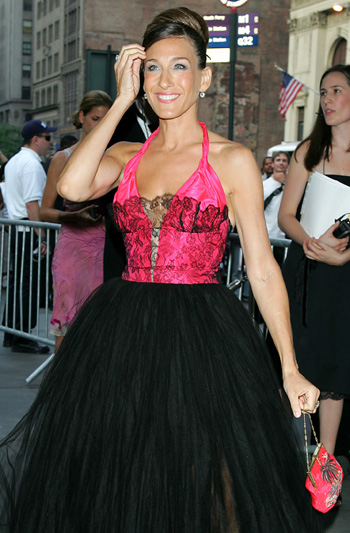 ”。
”。
6. 比如说,---When you're done with those notes, can I look at them? ---Of course, I'm almost finished. ---你看完那些笔记以后能不能借我看看? be done with 后面如果接人的话,虽然基本意义保持不变,但是日常的使用情况还不少。
7. 比如说,可能是带威胁语气的教训、收拾谁。比如说,---You're so stupid sometimes, Dad.---When I'm done with you, you'll wish you'd never said that. ---爸爸,你有时候真傻。---等我收拾了你,你会希望你从来没有说过这句话。
8. 如果be done with sb用在情侣之间,就是“分手”的意思,表示情尽缘了,断得一干二净。比如说,---Are you still dating Stan? ---No, I'm done with him. ---你还在跟Stan约会吗?---没有,我和他已经分手了。
9. be done with sb 也可以表示和某人的谈话告一段落,比如说,---Can I go now? ---Yes, we're done with you today, but you need to come back tomorrow for an interview. ---现在我可以走了吗?---可以,我们今天就和你说到这里,但是你明天得来面试。
 收听单词发音
收听单词发音 




